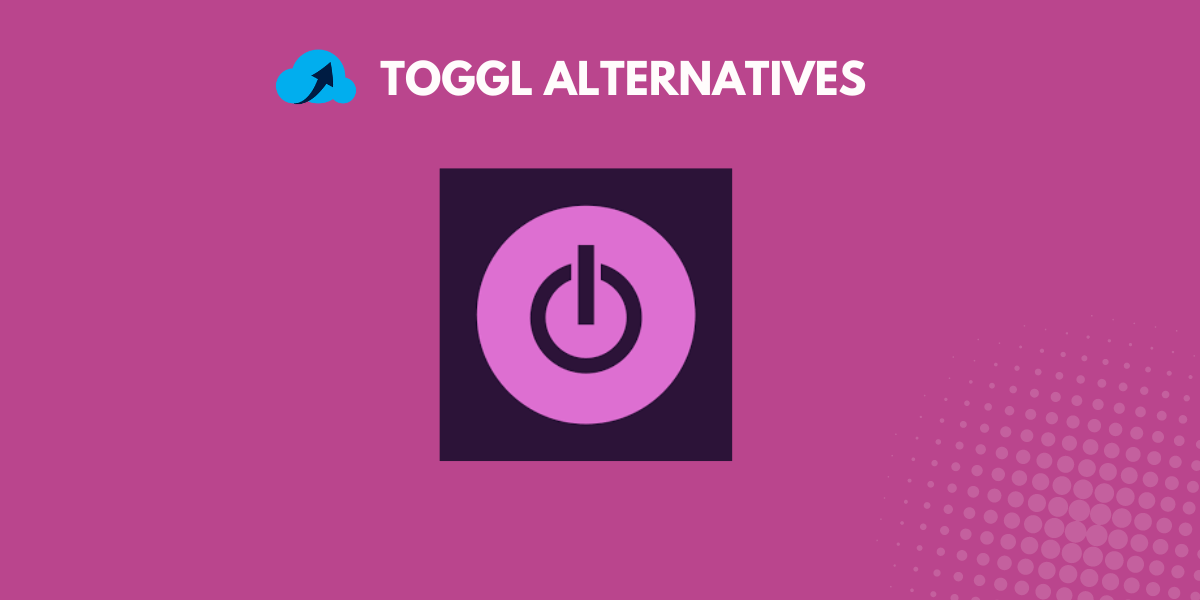Time tracking has become essential for maintaining productivity and ensuring efficient project management. Toggl has been a popular choice for many due to its ease of use and robust features.
However, as needs evolve, users often seek alternatives that better fit their specific requirements.
Whether it’s due to pricing concerns, feature limitations, or integration needs, finding the right time-tracking tool is crucial for optimizing productivity.
In this article, we’ll explore why you might look for Toggl alternatives, the criteria for choosing the best one, and provide a comprehensive review of the top alternatives available.
Why Look for Toggl Alternatives?
While Toggl is a powerful tool, it may not be the perfect fit for everyone. Users often cite various reasons for seeking alternatives:
- Pricing Issues: Toggl’s pricing structure might not be suitable for all, especially for larger teams or enterprises.
- Feature Limitations: Some users require more advanced features that Toggl does not offer, such as detailed reporting or more robust project management capabilities.
- User Interface Concerns: Preferences for the user interface can vary widely, and some may find Toggl’s interface less intuitive or lacking in certain aspects.
- Integration Needs: As businesses use a variety of tools, seamless integration is crucial. Toggl might not integrate with all the tools a business uses.
Understanding these pain points can help in identifying what to look for in an alternative, ensuring that the new tool addresses these specific needs.
Criteria for Choosing a Toggl Alternative
When searching for a Toggl alternative, it’s important to consider several key criteria to ensure the tool meets your needs:
- Time Tracking Capabilities: The core function should be robust and easy to use, allowing for accurate time tracking.
- Reporting and Analytics: Comprehensive reporting and analytics features are essential for monitoring productivity and making informed decisions.
- Integrations: The ability to integrate with other tools, such as project management software, communication platforms, and CRMs.
- User Interface: A clean, intuitive interface that enhances user experience.
- Pricing and Scalability: The tool should offer flexible pricing plans and be scalable to accommodate growth.
Different users, such as freelancers, small teams, and large organizations, may have unique requirements. It’s essential to identify these needs before choosing an alternative.
Best Toggl Alternatives For 2024
Here, we delve into detailed reviews of the top alternatives to Toggl, highlighting their key features, pricing, pros, cons, and example use cases.
1. Clockify
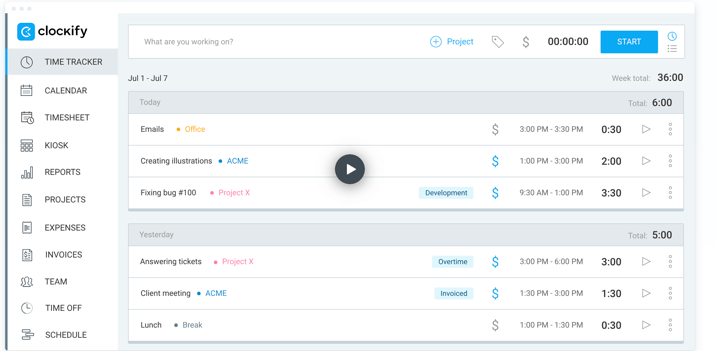
Clockify is a free time tracking tool that supports unlimited users and projects, making it a popular choice for freelancers and businesses of all sizes.
Key Features:
- Unlimited time tracking
- Detailed reporting and analytics
- Project and task management
- Integrations with popular tools (Asana, Trello, Slack, etc.)
- Mobile and desktop apps
Pros:
- Free for unlimited users
- User-friendly interface
- Comprehensive reporting features
Cons:
- Advanced features require paid plans
- Limited offline functionality
Use Case:
- Ideal for small businesses and freelancers who need a free, reliable time tracking solution.
Pricing:
- Free plan available; paid plans start at $9.99 per user per month.
2. Everhour
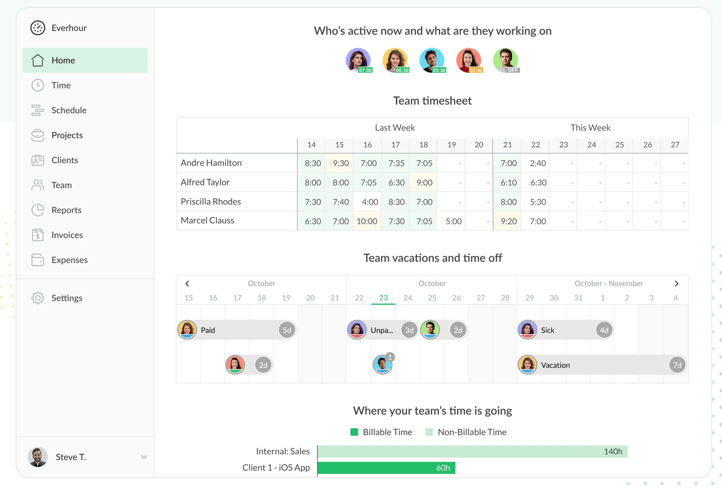
Everhour is a time-tracking and project-management tool designed to integrate seamlessly with popular project-management apps.
Key Features:
- Time tracking and task management
- Detailed project budgeting
- Reporting and analytics
- Invoicing capabilities
- Integration with Asana, Trello, Basecamp, and more
Pros:
- Strong integrations with project management tools
- Comprehensive project budgeting features
- Easy-to-use interface
Cons:
- Limited standalone features without integrations
- Higher cost for premium features
Use Case:
- Great for teams already using project management tools who need integrated time tracking.
Pricing:
- Starts at $8 per user per month.
3. TimeDoctor
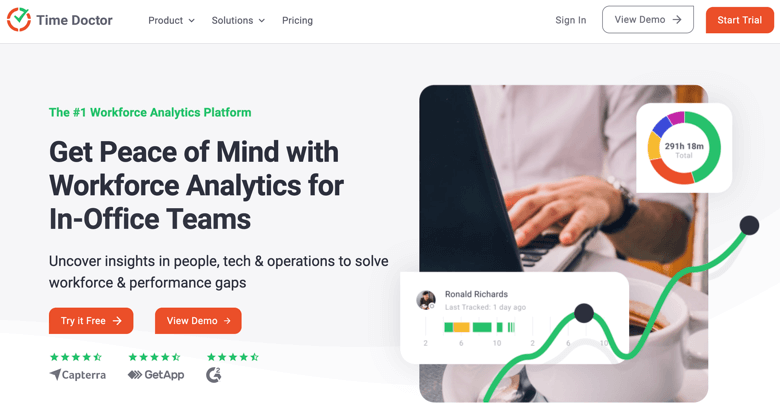
TimeDoctor is a powerful time tracking tool that includes features for productivity monitoring and employee management.
Key Features:
- Time tracking with screenshots
- Productivity monitoring
- Payroll and invoicing
- Integrations with various tools
- Detailed reporting
Pros:
- Comprehensive monitoring features
- Suitable for remote teams
- Strong reporting capabilities
Cons:
- Can be intrusive for some employees
- Complex setup
Use Case:
- Ideal for remote teams and managers needing detailed productivity insights.
Pricing:
- Starts at $7 per user per month.
4. DeskTime
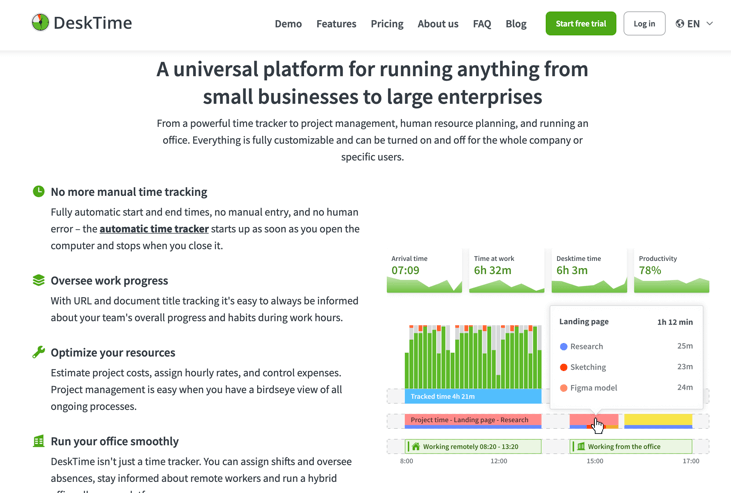
DeskTime is an automatic time tracking software that focuses on productivity analysis and project tracking.
Key Features:
- Automatic time tracking
- Productivity analysis
- Project tracking and management
- URL and app monitoring
- Customizable reports
Pros:
- Automatic tracking
- Detailed productivity insights
- Easy-to-use interface
Cons:
- Limited manual time entry options
- Higher cost for advanced features
Use Case:
Perfect for businesses focused on productivity improvement and automatic tracking.
Pricing:
Starts at $7 per user per month.
5. Hubstaff
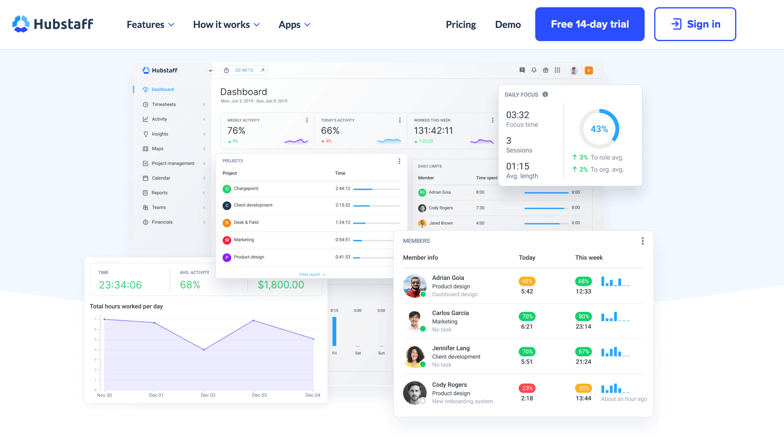
Hubstaff offers time tracking with GPS tracking, productivity monitoring, and project management features, making it suitable for both office and field teams.
Key Features:
- Time tracking with screenshots
- GPS tracking
- Productivity monitoring
- Payroll and invoicing
- Integrations with project management tools
Pros:
- GPS and productivity monitoring
- Strong project management features
- Detailed reporting
Cons:
- Can be perceived as invasive
- Higher cost for premium features
Use Case:
- Ideal for businesses with remote and field teams requiring comprehensive tracking and monitoring.
Pricing:
- Starts at $7 per user per month.
6. RescueTime
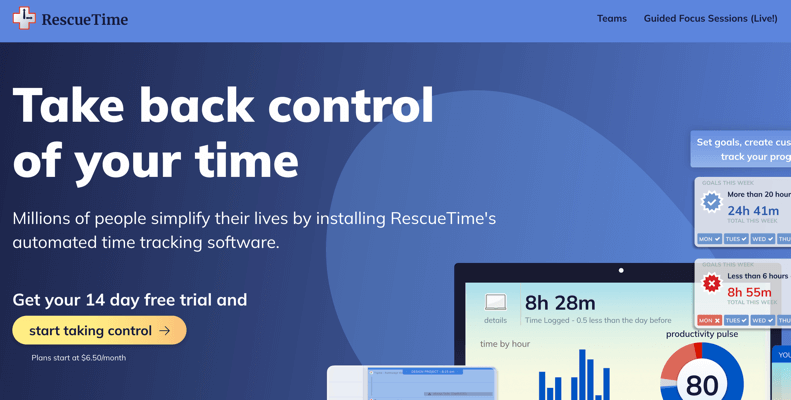
RescueTime is a time management software that provides insights into how users spend their time on digital devices.
Key Features:
- Automatic time tracking
- Productivity reports
- Goal setting and alerts
- Offline tracking
- Focus mode to block distractions
Pros:
- Automatic tracking
- Focus on productivity improvement
- User-friendly reports
Cons:
- Limited manual time entry
- Less suitable for project management
Use Case:
- Best for individuals and teams looking to improve personal productivity and time management.
Pricing:
- Free plan available; premium plans start at $6 per user per month.
7. Timeneye
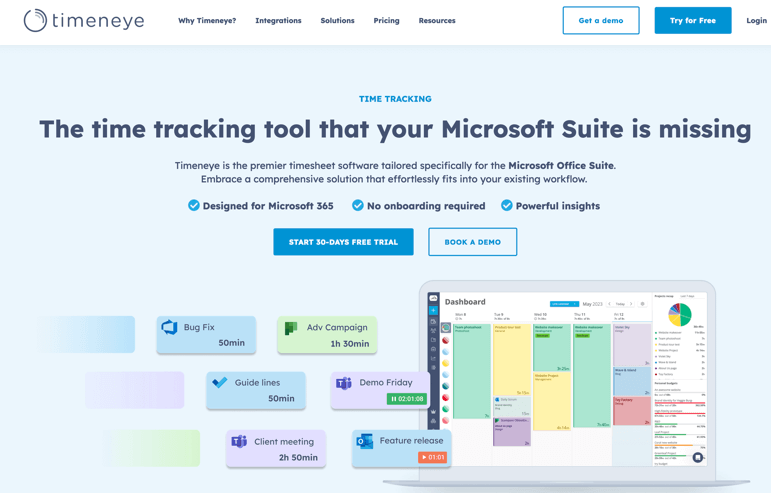
Timeneye is a simple and intuitive time tracking tool designed for small teams and freelancers.
Key Features:
- Manual and automatic time tracking
- Project and task management
- Reporting and analytics
- Integrations with project management tools
- Mobile app
Pros:
- User-friendly interface
- Easy project and task management
- Affordable pricing
Cons:
- Limited advanced features
- Basic reporting
Use Case:
Ideal for small teams and freelancers needing a straightforward time tracking solution.
Pricing:
Starts at $7 per user per month.
8. Harvest
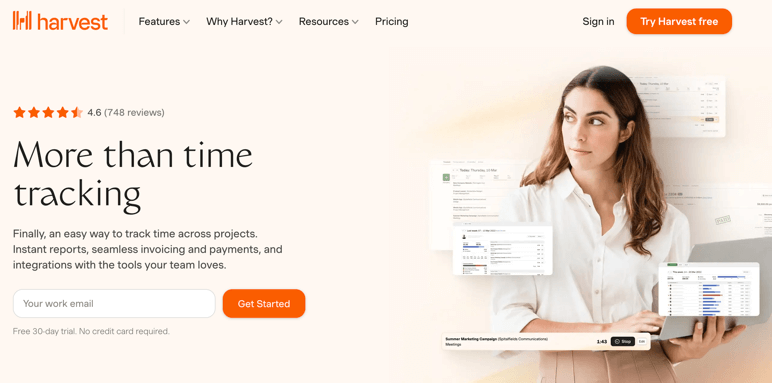
Harvest is a well-rounded time tracking and invoicing tool suitable for freelancers and small to medium-sized businesses.
Key Features:
- Time tracking and invoicing
- Expense tracking
- Reporting and analytics
- Integrations with popular tools
- Mobile and desktop apps
Pros:
- Strong invoicing features
- Detailed reporting
- Good integrations
Cons:
- Higher cost for larger teams
- Limited advanced project management features
Use Case:
Perfect for freelancers and small businesses needing integrated time tracking and invoicing.
Pricing:
Starts at $12 per user per month.
9. TimeCamp
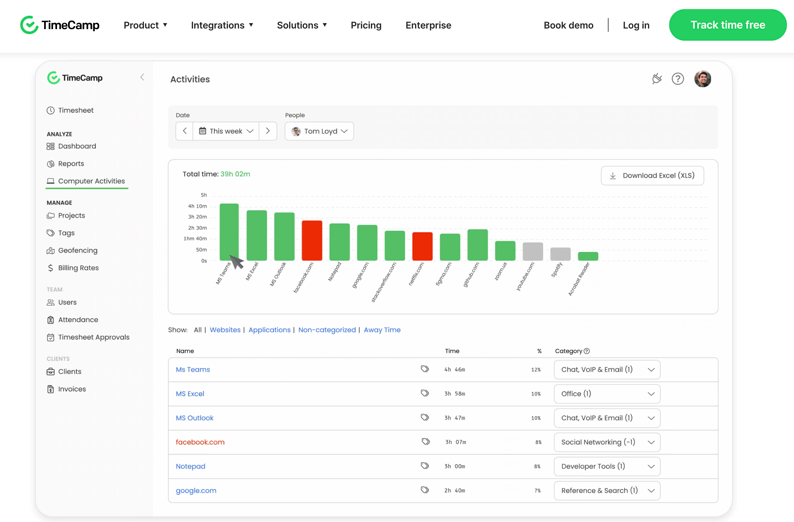
TimeCamp offers automatic time tracking with project management features, making it a versatile tool for teams and individuals.
Key Features:
- Automatic time tracking
- Project and task management
- Reporting and analytics
- Invoicing
- Integrations with various tools
Pros:
- Affordable pricing
- Automatic tracking
- Comprehensive features
Cons:
- User interface can be complex
- Limited offline functionality
Use Case:
Suitable for teams and individuals needing automatic time tracking and project management.
Pricing:
Free plan available; paid plans start at $5.25 per user per month.
10. ClickUp

ClickUp is an all-in-one productivity platform that combines time tracking, task management, and project management.
Key Features:
- Time tracking and task management
- Project management
- Reporting and analytics
- Customizable workflows
- Integrations with numerous tools
Pros:
- Comprehensive feature set
- Affordable pricing
- Highly customizable
Cons:
- Can be overwhelming for new users
- Some features require a learning curve
Use Case:
Ideal for teams needing an all-in-one productivity and project management solution.
Pricing:
Free plan available; paid plans start at $5 per user per month.
11. Timely App
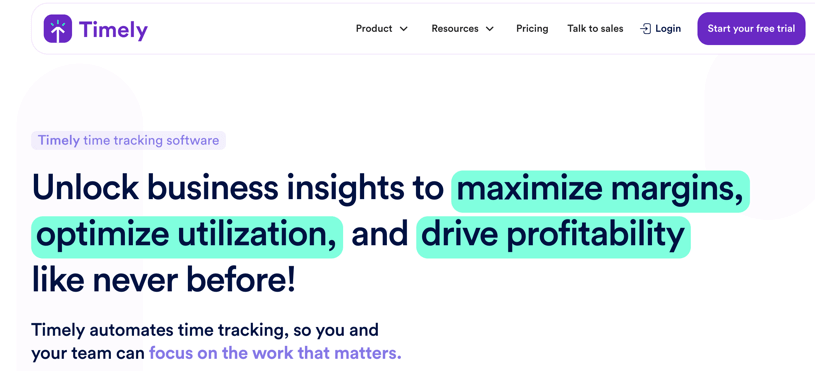
Timely App uses AI to automate time tracking, helping users focus on their work rather than logging hours.
Key Features:
- Automatic time tracking with AI
- Project management
- Reporting and analytics
- Budgeting and invoicing
- Integrations with other tools
Pros:
- Automatic tracking saves time
- Intuitive interface
- Strong reporting features
Cons:
- Higher cost
- Limited manual tracking options
Use Case:
Best for businesses and individuals looking for an automated time tracking solution.
Pricing:
Starts at $8 per user per month.
12. Trackabi
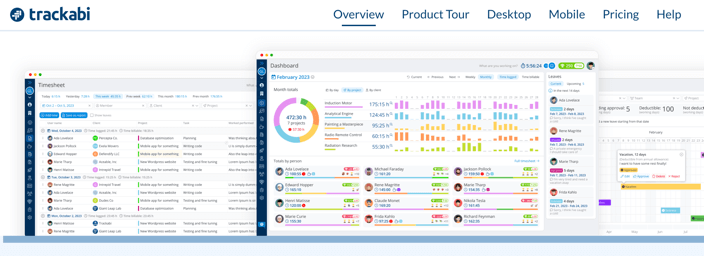
Trackabi combines time tracking, task management, and team collaboration features in one platform.
Key Features:
- Time tracking
- Project and task management
- Team collaboration tools
- Reporting and analytics
- Customizable workflows
Pros:
- Comprehensive features
- User-friendly interface
- Affordable pricing
Cons:
- Limited integrations
- Some features are still in development
Use Case:
Great for teams needing an integrated solution for time tracking and task management.
Pricing:
Starts at $6 per user per month.
13. ManicTime
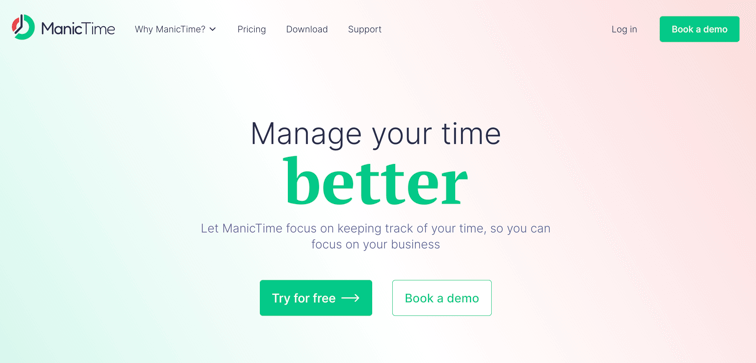
ManicTime is a time tracking software that offers automatic tracking and detailed analytics, making it ideal for productivity improvement.
Key Features:
- Automatic time tracking
- Detailed productivity reports
- Offline functionality
- Integrations with other tools
- Customizable reports
Pros:
- Automatic tracking
- Detailed analytics
- Works offline
Cons:
- Limited project management features
- Windows-centric
Use Case:
Best for individuals and small teams focused on productivity improvement.
Pricing:
Starts at $67 per user for a one-time purchase; team pricing is available.
14. Mavenlink

Mavenlink is a comprehensive project management tool that includes time tracking, resource planning, and financial management.
Key Features:
- Time tracking and project management
- Resource planning
- Financial management
- Collaboration tools
- Reporting and analytics
Pros:
- Comprehensive project management features
- Strong resource planning
- Detailed financial management
Cons:
- Higher cost
- Steep learning curve
Use Case:
- Ideal for large teams and enterprises needing robust project management and time tracking.
Pricing:
- Starts at $19 per user per month.
15. myhours
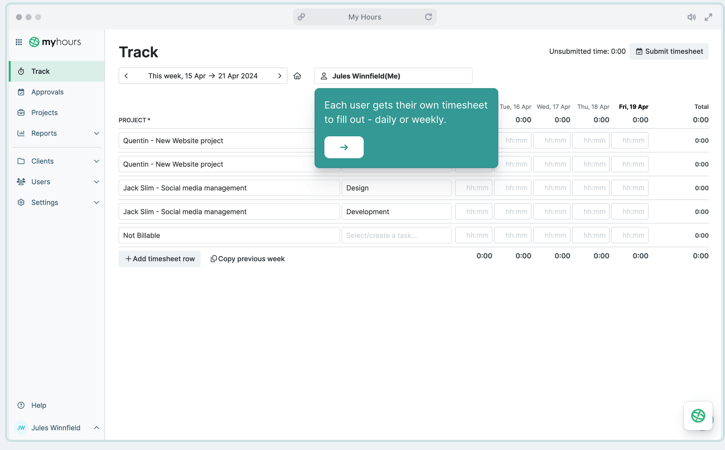
myhours is a simple and intuitive time tracking tool designed for teams and freelancers.
Key Features:
- Manual and automatic time tracking
- Project and task management
- Reporting and analytics
- Invoicing
- Mobile app
Pros:
- User-friendly interface
- Affordable pricing
- Good reporting features
Cons:
- Limited advanced features
- Basic project management
Use Case:
- Perfect for freelancers and small teams needing a straightforward time tracking solution.
Pricing:
- Free plan available
How to Transition to a New Time Tracking Tool?
A step-by-step guide on transitioning to a new time tracking tool ensures a smooth process:
- Data Migration: Ensuring all historical data is transferred accurately.
- Training Team Members: Educating the team on using the new tool effectively.
- Setting Up Integrations: Connecting the new tool with existing software for seamless workflow.
Tips for a smooth transition include involving the team in the decision-making process, providing adequate training, and starting with a trial period to adjust to the new tool.
Conclusion
Choosing the right time-tracking tool is crucial for optimizing productivity and efficiency. By evaluating your needs and trialing different options, you can find the best Toggl alternative that suits your requirements. The tools reviewed in this article offer a range of features and pricing plans, ensuring there is an option for everyone.
If you found this article helpful, please share it with your network. Feel free to leave a comment with your personal experiences or questions about time tracking tools. Your feedback helps us improve and provides valuable insights for other readers.
You May Also Like:
